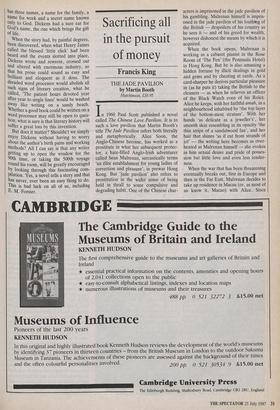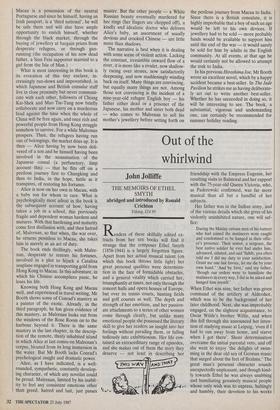Sacrificing all in the pursuit of money
Francis King
THE JADE PAVILION by Martin Booth
Hutchinson, £10.95
In 1960 Paul Scott published a novel called The Chinese Love Pavilion. It is to such a love pavilion that Martin Booth's title The Jade Pavilion refers both literally and metaphorically. Alice Soon, the Anglo-Chinese heroine, has worked as a prostitute in what her subsequent protec- tor, a hate-filled Anglo-Irish adventurer called Sean Mulrenan, sarcastically terms `an elite establishment for young ladies of correction and pleasure', in prewar Hong Kong. But 'jade pavilion' also refers to prostitution in the wider sense of being held in thrall to some compulsive and degrading habit. One of the Chinese char- acters is imprisoned in the jade pavilion of his gambling. Mulrenan himself is impris- oned in the jade pavilion of his loathing of the British — despoilers of his country as he sees it — and of his greed for wealth, however dishonest the means by which it is acquired.
When the book opens, Mulrenan is working as a cabaret pianist in the Rose Room of 'The Pen' (the Peninsula Hotel) in Hong Kong. But he is also amassing a hidden fortune by illicit dealings in gold and gems and by cheating at cards. As a card-sharper he derives particular pleasure in (as he puts it) taking the British to the cleaners — as when he relieves an officer of the Black Watch even of his Rolex. Alice he keeps, with her faithful amah, in a neighbourhood inhabited by 'the top layer of the bottom-most stratum'. With her hands 'as delicate as a jeweller's', her smooth skin resembling in its opacity 'the thin strips of a sandalwood fan', and her hair that shines 'as if cut from strands of jet' — the writing here becomes as over- heated as Mulrenan himself — she evokes in him sexual desire and pride of posses- sion but little love and even less tender- ness.
When the war that has been threatening eventually breaks out, first in Europe and then in the Far East, Mulrenan decides to take up residence in Macau (or, as most of us know it, Macao) with Alice. Since Macau is a possession of the neutral Portuguese and since he himself, having an Irish passport, is a 'third national', he will be safe there and will also have ample opportunity to enrich himself, whether through the black market, through the buying of jewellery at bargain prices from desperate refugees, or through gun- running (the occupation of his now dead father, a Sinn Fein supporter married to a girl from the Isle of Man.) What is most interesting in this book is its evocation of this tiny enclave, in- creasingly run-down and impoverished, in which Japanese and British consular staff live in close proximity but never communi- cate with each other, followers of Chiang Kai-Shek and Mao Tse-Tung now briefly collaborate and now carry on a murderous feud against the time when the whole of China will be free again, and once rich and powerful people from Hong Kong struggle, somehow to survive. For a while Mulrenan prospers. Then, the refugees having run out of belongings, the market dries up. It is then — Alice having by now been deli- vered of a son and he himself having been involved in the assassination of the Japanese consul (a perfunctory, limp account this) — that he flits off on a perilous journey first to Chungking and then to India, in the hope, futile as it transpires, of restoring his fortunes.
Alice is now on her own in Macau, with a baby son for whom to care. What is psychologically most adroit in the book is the subsequent account of how, having taken a job in a school, this previously fragile and dependent woman hardens and matures. With that hardening and maturity come first disillusion with, and then hatred of, Mulrenan, so that when, the war over, he returns penniless to Macau, she takes him in merely as an act of duty.
The book ends thrillingly, with Mulre- nan, desperate to restore his fortunes, involved in a plot to hijack a Catalina seaplane engaged in transporting gold from Hong Kong to Macau. In this adventure, in which his Chinese accomplices panic, he loses his life.
Knowing both Hong Kong and Macau well, and experienced in travel writing, Mr Booth shows some of Conrad's mastery as a painter of the exotic. Already, in the third paragraph, he has given evidence of this mastery, as Mulrenan looks out from the windows of the Rose Room on to the harbour beyond it. There is the same mastery in the last chapter, in the descrip- tion of the remote, thinly inhabited island in which Alice at last comes on Mulrenan's corpse, bloated from its long immersion in the water. But Mr Booth lacks Conrad's psychological insight and dramatic power.
Alice, as I have indicated, is a well- rounded, sympathetic, constantly develop- ing character, of which any novelist could be proud. Mulrenan, limited by his inabil- ity to feel any consistent emotions other than greed, hatred and lust, just passes muster. But the other people — a White Russian beauty eventually murdered for her rings (her fingers are chopped off), a kindly and idealistic doctor who delivers Alice's baby, an assortment of usually devious and crooked Chinese — are little more than shadows.
The narrative is best when it is dealing with some scene of violent action. Lacking the constant, irresistible onward flow of a river, it is more like a rivulet, now shallow- ly racing over stones, now satisfactorily deepening, and now maddeningly winding back on itself. Many things are convincing, but equally many things are not. Among those not convincing is the incident of a nine-year-old refugee English boy — his father either dead or a prisoner of the Japanese, his mother and sister both dead — who comes to Mulrenan to sell his mother's jewellery before setting forth on the perilous journey from Macau to India. Since there is a British consulate, it is highly improbable that a boy of such an age would be left to his own devices. If jewellery had to be sold — more probably funds would be available to support him until the end of the war — it would surely be sold for him by adults in the English community. At all events, at that age he would certainly not be allowed to attempt the trek to India.
In his previous Hiroshima Joe, Mr Booth wrote an excellent novel, which by a happy accident became a best-seller. In The Jade Pavilion he strikes me as having deliberate- ly set out to write another best-seller. Whether he has succeeded in doing so, it will be interesting to see. The book, a substantial, vigorous and undemanding one, can certainly be recommended for summer holiday reading.



















































 Previous page
Previous page